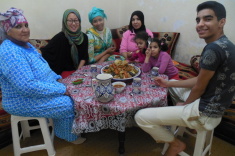A man from the Netherlands had been staying at my hotel ever since my arrival. He is here doing “research” on street children, who are certainly plentiful in the touristy-Thamel area of Kathmandu. I would often see this man eating breakfast with various young Nepali children, so one day I asked him if this was part of his research. He replied that he had befriended several children throughout the course of his research, and because of his concern for their well-being, had them come for a hearty meal from time to time.
He told me that one 13-year old, Uttam, had concerned him in particular. A few months earlier, Uttam’s mother had declared that he was old enough to take care of himself and so kicked him out of the house. Since then, Uttam has been struggling to keep his head above ground. He’s been renting a room about 15 minutes from our hotel and has been selling drawings in Thamel to pay his rent. As you can imagine, selling amateur artwork is not the best way of making a living, so Uttam barely makes the 1,000 rupees a month (roughly $18CAD) to cover his rent, let alone extra money to eat and clothe himself.
The Dutch man introduced me to Uttam, and he struck me as an incredibly intelligent, nice, trustworthy kid. Usually I refrain from giving money to street people because I can never be sure exactly what they’re going to buy with this money (and in fact, in Kathmandu there is a great glue-sniffing problem amongst street kids). But I thought of a great way to help Uttam – a way that would also help me. I asked him if he wanted to come in the mornings and help me a little bit with my Nepali in exchange for some tea and eggs. He gladly agreed, and I could see the happiness in his eyes (since today, the Dutch man left for Pokhara).
So, this morning at 9am I met Uttam on the terrace. We had breakfast together and studied a bit of Nepali. But his story was so interesting and heart-wrenching that I, honestly, didn’t do that much work. Uttam’s father left him when he was only one. A few years ago, his mother declared that he was old enough to work, so he began selling artwork in Thamel, in addition to going to school. He brought home decent money (800 rupees a day – business was better back then), which he unquestioningly gave to his mother. But his mother used most of it on phone conversations with “some man” who eventually became her husband. It was this husband that brainwashed Uttam’s mother to kick him out two months ago. Now, Uttam lives in a tiny room with only a bed and a CD player (a gift from a tourist). On a lucky day, he will come to the hotel for breakfast and eat dinner at an aunt’s house. Often, he’ll get one of those meals, but not both. Just as often, unfortunately, he won’t get either of them. He might have made enough money that day to buy some crackers and a cup of tea, though, so he doesn’t completely starve like many on Kathmandu’s unforgiving streets.
Uttam’s dream is to go to school again. Ideally, he says he’d like to attend morning school (6-11am) so that he has his afternoons free to make money. Does this sound like a 13-year old to you?
Uttam and I spent three hours together this morning. We ate and chatted. I brought him to my room and showed him my growing collection of story books, which he eagerly ate up. I let him shower, since running water is a rarity for him. And I let him play computer games on my computer. He’ll come again tomorrow morning, but I hope we’ll actually do a little more language study than today!
Wandering Footsteps: Wandering the World One Step at a Time » A travel journal following a family on their overland trip around the world.
|
|
|



Anonymous - I really feel sad for him. I think the bigger problem is that we have brought these children into this imperfect world of ours and heartlessly say …”deal with it”.
People must understand that it is an immense responsibility to bring children into this world.
Clearly, there is not much value for a human life anymore.
I wish there would come a day when we no longer have orphanages and homes for the destitute. I asked a person who was managing a large fund that helped children what their long term goals were.
She simply said they wanted to help more and more children come out of the misery. I think their real goal should be to stop existing after a said time. That can happen only when they have addressed the real problem. When a child is put into misery no more.
-Kiran